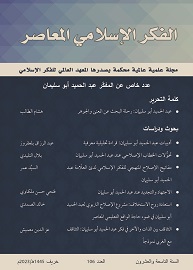Abstract
This article treats central themes in AbdulHamid AbuSulayman's intellectual project: the dialogue of civilizations, Islam and the West, Western studies, and civilizational acculturation with the other. It attempts to capture the most salient features of his methodological and intellectual approach, including the general and particular strengths that lie therein. The article identifies AbuSulayman’s core principles of acculturation with the Western Other, these being: understanding the authentic self and self-awareness, addressing the crisis of the Muslim mind, understanding the development of conscience and its connection with self-awareness (the role of conscience in guiding the will), understanding the methodology of acculturation, and having objective knowledge of the Western Other without exaggeration or distortion. The article highlights the main findings of AbuSulayman’s project and the impact these have had in shaping reform discourse and offering a paradigm for Islamic civilizational renewal. The article shows how reform and civilizational renewal are central to AbuSulayman’s thought and the basis from which he addresses other topics including the notion of fiqh al-wāqiʿ (jurisprudence based on an understanding of context and reality) and its relationship to developing a framework for positive acculturation.

This work is licensed under a Creative Commons Attribution-NonCommercial-NoDerivatives 4.0 International License.
Copyright (c) 2023 المعهد العالمي للفكر الإسلامي





